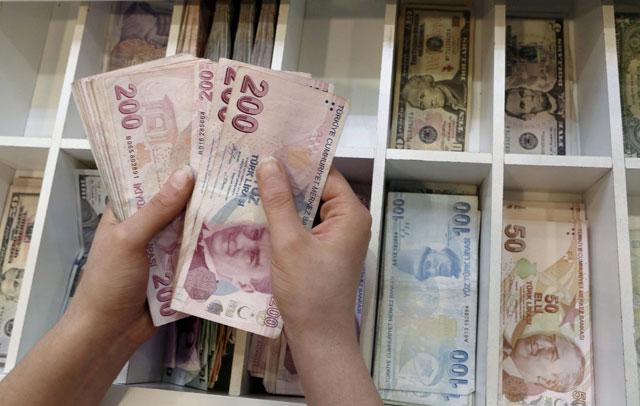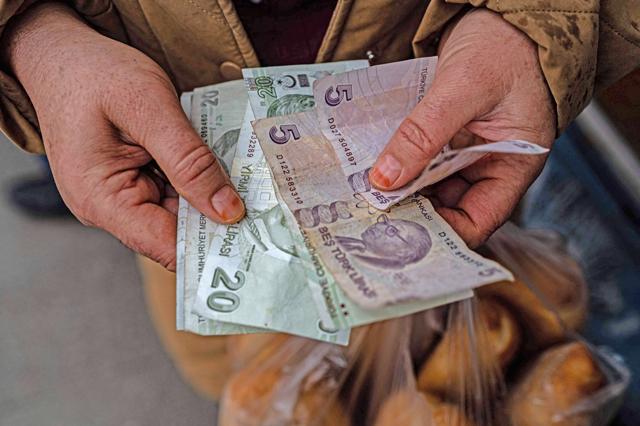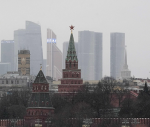You are here
Turkish rate hike fails to boost ailing lira
By AFP - Jan 24,2017 - Last updated at Jan 24,2017

A money changer counts Turkish lira bills at a currency exchange office in central Istanbul, Turkey, on August 21, 2015 (Reuters photo)
ANKARA — The Turkish central bank on Tuesday hiked its headline interest rate by 75 basis points in a bid to boost the ailing lira but failed to impress markets looking for even sharper action.
The monetary policy committee of the bank said the overnight lending rate was being lifted to 9.25 per cent from 8.5 per cent, coming on the heels of a rate hike in November last year.
But the committee kept its one-week repurchasing (repo) rate unchanged at 8 per cent and the overnight borrowing rate was kept at 7.25 per cent.
But with markets hoping for even more and taken aback by the absence of any move in the repo rate, the lira initially lost 1.95 per cent in value against the dollar after the announcement.
It later stabilised to trade at 3.76 to the greenback, a loss in value of 0.3 per cent on the day but well short of the rally many had hoped for after the meeting.
Some economists expected interest rates to be increased by 100 basis points — or a full percentage point — after the lira lost seven per cent of its value against the dollar in the first four weeks of 2017 alone.
The lira's recent performance has been the worst of any emerging markets currency, alarming the government ahead of a referendum expected in April on changing the constitution to give President Recep Tayyip Erdogan more power.
The bank opened the door to further hikes, warning in a statement that a "significant rise in inflation" was expected in the short term.
Inflation was reported at 8.5 per cent in December, compared with 7 per cent the previous month.
"The committee decided to strengthen the monetary tightening in order to contain the deterioration in the inflation outlook," it said.
It added: "If needed, further monetary tightening will be delivered."
'Not ready for
decisive hikes'
Economists said the decision showed the bank was not convinced by the need for radical rate hikes to halt the plunge in value of the lira and would prefer employ other tactics.
The lira has since January 10 pared losses after the bank took measures to increase the amount of liquidity in the market, boosting demand for the lira.
The decision showed the bank was not ready to deliver "decisive, orthodox hikes even so soon after [the lira] hit all-time lows in a move that seemed on the verge of turning disorderly", Inan Demir of Normura International said in a note.
"We feel the bank still thinks that this Turkish lira depreciation will be a temporary one and its impact on inflation will be temporary," said Ozgur Altug, chief economist at BGC partners in Istanbul.
Finansbank economist Gokce Cilek said it would take "another round of sharp depreciation" for interest rates to be hiked further, saying the bank would be content for now with non-interest rate tools.
Economists also complained that policymaking was needlessly confusing at a critical time, with the date of the next monetary policy meeting unknown and the bank still employing an array of multiple interest rates.
William Jackson, senior emerging markets economist at Capital Economics, said there were "worrying signs" the bank is making the "already-convoluted monetary policy setup even more complicated".
The ruling Justice and Development Party has dominated Turkish politics since winning its first majority in 2002. The economy's strong performance and investment in public infrastructure has been a pillar of its success.
Hurriyet daily's well-connected columnist Abdulkadir Selvi said the economy would be the first priority on the government's agenda as the country headed to the referendum.
"The aim of the government is to breathe life into the economy before the referendum to calm the public," Selvi wrote Tuesday.
Related Articles
ISTANBUL — The Turkish central bank on Thursday announced it was hiking its main interest rate by 50 basis points, in a bid to counter a dra
ISTANBUL — Turkey's lira strengthened on Tuesday, after a wild start to the week saw its value swing by 30 percentage points, in response to
ISTANBUL — Turkey's troubled lira surged on Thursday after the central bank delivered a much larger than expected interest rate hike that br
















